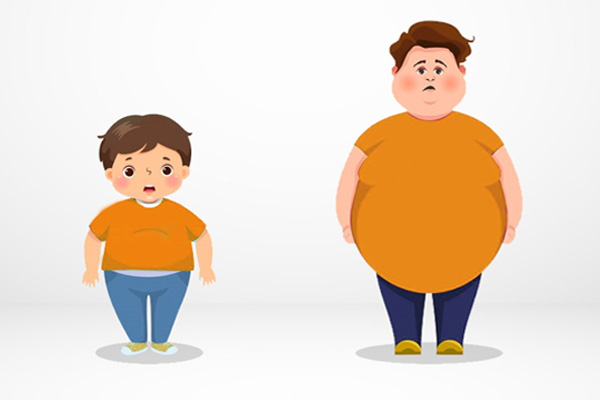Introduction
Childhood obesity is a growing epidemic that affects millions of children worldwide. The World Health Organization (WHO) estimates that more than 41 million children under the age of 5 are overweight or obese globally. This number is expected to double by 2025. Childhood obesity can lead to numerous physical, social and psychological problems, including type 2 diabetes, high blood pressure, sleep apnea, low self-esteem and depression. It can also have serious long-term implications on a child’s overall health as they grow into adulthood. That’s why it’s important to start early and take preventative steps to ensure your children aren’t at risk for developing obesity-related problems later in life. In this blog post, we’ll provide 7 tips on how you can help your kids stay healthy and prevent childhood obesity.

The seriousness of childhood obesity
The seriousness of childhood obesity
According to the Centers for Disease Control and Prevention (CDC), childhood obesity has more than doubled in children and quadrupled in adolescents in the past 30 years.
The CDC reports that in 2012, more than one third of children and adolescents were overweight or obese.
Childhood obesity is a serious medical condition that affects children and adolescents. Obesity is defined as having a body mass index (BMI) at or above the 95th percentile for children and teens of the same age and sex.
Childhood obesity can lead to a number of health problems, including type 2 diabetes, high blood pressure, sleep apnea, and joint problems. Additionally, children who are obese are at an increased risk for social and psychological problems, such as bullying and low self-esteem.
There are a number of factors that contribute to childhood obesity, including genetics, lifestyle choices, and environmental factors. Obesity is most commonly caused by a combination of these factors. Some medical conditions can also contribute to weight gain and lead to obesity.
Treating childhood obesity requires a comprehensive approach that includes making changes in diet and physical activity, as well as addressing any underlying medical conditions. Medications may be used in some cases to help control weight gain. Surgery may be an option for severely obese children who have not been able to lose weight with other treatments.

#7 ways to controlling your children’s obesity
There are many ways that you as a parent can help control your children’s obesity and weight problems. Here are 7 tips:
1. Be a good role model for your children. If you are obese or overweight, try to lose weight yourself. Set a goal and lead by example.
2. Encourage your children to be active and lead an active lifestyle. Get the whole family involved in activities like playing sports, going for walks, or riding bikes together.
3. Limit screen time for your children. This includes TV, computer, and video games. Consider having “screen-free” hours or days in your home.
4. Make healthy food choices available to your children and limit unhealthy junk food options. Stock up on fruits, vegetables, whole grain foods, and low-fat dairy products while keeping sugary snacks and drinks to a minimum.
5. Help your child develop healthy eating habits by teaching them about portion sizes and balanced meals.Encourage them to eat slowly and stop when they feel full.
6. Work with your child’s doctor to come up with a plan to manage their obesity or weight problem safely and effectively over time through diet, physical activity, and if necessary, medication or surgery..
7.Finally, don’t forget to praise your child for making healthy choices!
What are the consequences of childhood obesity?
The consequences of childhood obesity can be divided into three main categories: physical, psychological, and social.
Physical consequences of childhood obesity can include high blood pressure, high cholesterol, type 2 diabetes, sleep apnea, joint problems, and fatty liver disease. Children who are obese are also at an increased risk for developing various types of cancer later in life.
Psychological consequences of childhood obesity can include low self-esteem, depression, anxiety, and poor body image. Obese children are often teased and bullied by their peers, which can lead to social isolation.
Social consequences of childhood obesity can include discrimination in school and the workplace, lower educational attainment, and reduced economic opportunities. Childhood obesity can also lead to social isolation and poorer mental health.
How to prevent childhood obesity?
Childhood obesity has reached epidemic proportions in the United States. According to the Centers for Disease Control and Prevention (CDC), the prevalence of obesity among children and adolescents aged 2-19 years increased from 5% in 1980 to 18% in 2012.
There are many factors that contribute to childhood obesity, including genetics, metabolism, behavior, culture, and the environment. While some children may be more genetically predisposed to obesity than others, there are still many steps that parents can take to help prevent their children from becoming overweight or obese.
Here are some tips for preventing childhood obesity:
Encourage healthy eating habits: Help your child develop a healthy relationship with food by teaching them about nutrition and modeling healthy eating habits yourself. Encourage them to eat plenty of fruits, vegetables, and whole grains and to limit processed foods, sugary drinks, and excessive amounts of saturated and unhealthy fats.
Involve Them in physical activity: Get your children moving every day! Set aside time for family activities like playing catch, going for walks or bike rides together, or dancing around the living room. Help them find an activity they enjoy and make it a part of their daily routine.
Limit screen time: Too much time spent in front of screens – including TVs, computers, tablets, and phones – can lead to unhealthy habits like snacking mindlessly and becoming less active overall. The American Academy of Pediatrics recommends limiting screen time to no more than 1-2 hours per day for children and teens.
Get adequate sleep: The CDC recommends that children aged 6-13 get 9-11 hours of sleep each night, while teenagers should get 8-10 hours. Studies have found that kids who don’t get enough sleep are more likely to be overweight or obese.
Lead by example: Children learn from the adults in their lives, so it’s important to model healthy behaviors yourself. Make sure you are eating healthy meals and snacks, staying active, and getting plenty of rest yourself. This can help set a good example for your child and make it easier for them to develop healthy habits of their own.

Conclusion
Childhood obesity can be a very serious issue and it is important to take steps now to ensure your children’s health in the future. We hope that these 7 tips have given you some ideas for how you can help control their weight and prevent them from becoming obese. Remember, prevention is better than cure so make sure you are taking action today!








